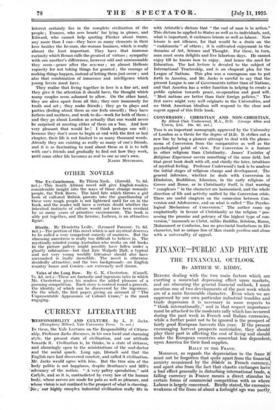THIS is an important monograph, approved by the University of
London as a thesis for the degree of D.D. It strikes out a new line by being a pioneer attempt to deal with the pheno- mena of Conversion from the comparative as well as the psychological point of view. For Conversion is a feature in other religions than Christianity. James' Varieties of Religious Experience covers something of the same field, but that great book dealt with all, and chiefly the later, intuitions of mystical feeling. Professor Underwood's task is to analyse the initial stages of religious change and development. The general inference, whether he deals with Conversion in Hinduism, Buddhism, Islamism, in the early religions of Greece and Rome, or in Christianity itself, is that warring " complexes " in the character are harmonized, and the whole direction of life and activity unified by the Conversion crisis. There are useful chapters on the connexion between Con- version and Adolescence, and on what is called " The Psycho- logical Mechanism of Conversion." The author sums up emphatically in favour of Christianity as the religion " pos- sessing the promise and potency of the highest type of con- version," inasmuch as Christ, unlike Buddha, Krishna, Rama, Muhammed or Confucius, has no provincial limitations in His character, but as unique Son of Man stands peerless and alone with a universality of appeal.


























































 Previous page
Previous page